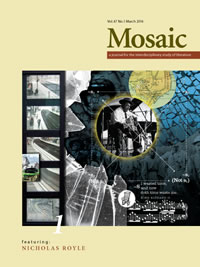Issue 47.1
Overview

General Issue
Published: March 2014
View the issue introduction or see the issue summary and contents below.
10 essays, totalling 224 pages
$24.95 CAD
Nicholas Royle is Professor of English at the University of Sussex. He is the author of numerous books, including Veering (2011) and the novel Quilt (2010). This issue will feature a “Crossings” interview with Professor Royle and new writing by him.
Crossings: An Interview with Nicholas RoyleDawne McCance with Karalyn Dokurno, Ryan Fics, and Riley McGuire The following interview with Nicholas Royle, another in Mosaic’s “Crossings” series, took place in Winnipeg, Manitoba on 21 October 2013. Along with Mosaic editor, Dawne McCance, three of the journal’s graduate student interns participated in the interview: Karalyn Dokurno, Ryan Fics, and Riley McGuire. Mosaic is pleased to publish the interview here. | |
Quick Fiction: Remarks on Writing TodayNicholas Royle Nicholas Royle delivered the following lecture in Winnipeg on 22 October 2013, in connection with his Mosaic-sponsored Distinguished Visiting Lecturer visit to the University of Manitoba. Mosaic is pleased to publish the lecture here. | |
Reading Joseph Conrad: Episodes from the CoastNicholas Royle Delivered as a lecture at Hitotsubashi University, Tokyo, in March 2013, on the eve of the second anniversary of “the events,” as Royle’s host called them, this essay is, in part, about Fukushima. It focuses in a timely/untimely way on Conrad’s remarkable story “Typhoon.” The essay also connects to various themes raised in the preceding “Quick Fictions” lecture, including in particular the notion of quick fiction. | |
What Does Greimas’s Semiotic Square Really Do?John J. Corso Semiotician A.. Greimas introduced the semiotic square to consider semiotic relationships (and constraints) between binary terms. Literary, art, and music critics have seized upon the procedure to analyze actants, narrative structures, and discursive paradigms. This essay argues that current literature ignores the visual aspects of the square. | |
Cultural Appropriation for Mainstream Consumption: The Musical Adaptation of Dessa RoseReanna A. Ursin Analyzing Lynn Ahrens and Stephen Flaherty’s 2005 musical adaptation of Sherley Anne Williams’s Dessa Rose, this essay suggests that mainstream consumption of black cultural expression is substituted for meaningful social change, highlighting the musical’s investment in a colour-blind ideology that reproduces the very erasures against which Williams wrote. | |
Nathaniel Hawthorne’s Warring Doctors and Meddling MinistersAnthony Cerulli and Sarah Berry Nathaniel Hawthorne’s stories "The Rejected Blessing" and "Rappaccini’s Daughter" dramatize ideological competition among doctors and clergymen from Renaissance Italy to colonial Boston over care of the body. In the context of Hawthorne’s life, these stories show his foresighted theorizing of medical hegemony and its dangers to public and individual health. | |
Haunted by the Past: Traumatic Rememory and Black Feminism in Gayl Jones’s CorregidoraStella Setka This essay analyzes the ways that Corregidora addresses issues of black female sexuality as they relate to the trauma of slavery. By engaging theories of memory and black feminist criticism, the essay suggests that Ursa liberates herself from historical cycles of oppression by reclaiming her agency and sexuality. | |
The Ghostly Presence in Chanrithy Him’s ‘Please Give Us Voice’Bunkong Tuon In closely reading Him’s poem, this essay discusses poetry of witness, ghosts and haunting, Cambodian refugees, cultural trauma, and Cambodian American testimonial. | |
Affect et dramatisation dans l’écriture de la conversion : l’exemplarité du récit augustinienSara Danièle Bélanger-Michaud Cet essai interroge le rôle de l’affect dans l’écriture de la conversion. Il s’intéresse pour ce faire au texte des Confessions d’Augustin, identifié comme un espace d’expérimentation exemplaire de l’importance des affects et de la mise en scène liés à la pensée littéraire dans une optique de transformation spirituelle. | |
The ‘Dark Power of Destiny’ in George Orwell’s Nineteen Eighty-FourMartha C. Carpentier Applying a Lacanian approach to Orwell’s narrative strategies in Nineteen Eighty-Four, this essay analyzes the protagonist’s attempt to evade the Symbolic by resurrecting archaic memories of preoedipal union through a repetitive triadic play of signifiers. Engaging Freud and Deleuze, the essay views his masochistic behaviour as a challenge to patriarchy via identification with the feminized position. |